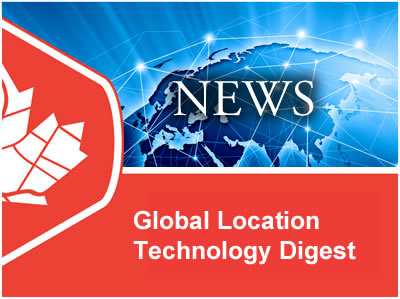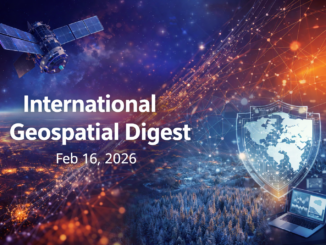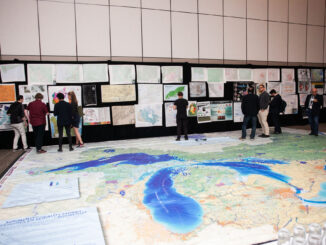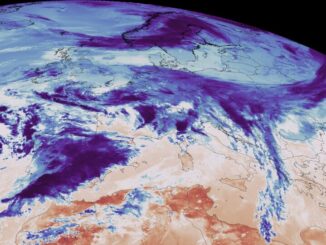
These stories are making waves in world geospatial news. The dark side of smart cities, a possible pay-wall for Landsat data, the amazing Earthtime Platform launched for earth Day, Chinese satellite Gaofen-5, Leidos… and more.
Facebook Blows it! The Age of Big Data
Are we having a big data wake-up call? In the shadow of Cambridge Analytica and investigations into Facebook’s privacy standards, perhaps it’s time we learn that our computer searches, Facebook likes, credit card transactions and other ephemera, when connected to our credit bureau files, create a detailed profile of our personal information. Data collectors are able to draw certain conclusions from this information, from the model of car you plan to buy to your social security number. Regulations like the EU’s General Protection Regulation are already in effect, digital leaders like Google and Facebook are likely to follow suit–the question is, when?
CREATE Lab reveals the EarthTime website

“EarthTime tries to build the common ground…” In simple terms, this is the mission according to Illah Nourbakhsh of CREATE Lab, which launched the website EarthTime on World Earth Day.
EarthTime reveals dramatic new satellite images of earth from space with the goal of showing the trends and changes to the planet over the past two decades. With data sets from the World Bank, NASA, Climate Central, the International Renewable Energy Agency, the WWF and others, experts create a layered, comprehensive narrative that details the radical changes the earth is undergoing, including expert analyses on global challenges like deforestation, city growth, glaciers, renewables, sea-level rise, surface-water gain and urban fragility. Already used in public outreach in schools and museums, the platform has been designed in the hopes that users will be better informed regarding the decisions we make and their impact on the earth.
Copernicus Mission launches Sentinel-3B
A new member of the Copernicus Mission has joined its sibling in space!
On April 25 the European Union successfully launched its new earth observation satellite, Sentinel-3B, into a Sun-synchronous orbit (SSO) at an altitude of about 503 miles. Tasked with monitoring the Earth’s ocean, mapping vegetation growth and measuring the thinning ice sheets, Sentinel-3B will remain in operation for the next seven years. It joins its twin Sentinel-3A, which orbits the same plane (separated by 140 degrees) and also contains an Ocean and Land Colour Instrument (OLCI) that carries five cameras. The satellites are part of the EU’s ambitious Copernicus mission, which aim to create a fleet of Earth-observing satellites in space so that even more data can be gathered.
Will we have to start paying for Landsat imagery?

Images from Landsat satellites are currently free-use for scientists—but that may be about to change.
The Landsat pictures have been free for download since 2008, and the images allowed for huge discoveries to be made in remote-sensing, urban growth, land use and more. However, the U.S. government is now considering whether to charge for access to the imagery from the Landsat satellites and an aerial-survey programme run by the Department of Agriculture. Scientists who rely on this service worry that limited access could seriously impair the ability to report on environmental changes, conservation, agriculture and public health. There are currently no ideal substitutes for the 46-year data archive provided by Landsat, and the introduction of fees for use could be instituted as soon as 2019.
The Dark Side of Smart cities and data privacy concerns
Smart cities are using our devices to make our urban spaces more liveable. Drawing data from the Internet of Things (which can include everything from smart phones and laptops to traffic lights) a smart city uses technology like urban sensing, geotracking, and real-time analytics to manage resources and optimize services. But as cities become smarter they also become vulnerable to cyber-attack, and the personal data being sold to third-party clients. As the smart city trend continues to grow, the only way to avoid massive data breaches and hold stakeholders accountable is to keep citizens aware of how their cities are using their devices and their data.
Chinese satellite Gaofen-5 joins CHEOS program in Earth observation
China launched its next Earth-observation satellites, Gaofen-5, on May 2nd to mark China’s Space Day. As part of the China High-resolution Earth Observation System (CHEOS) program, Gaofen-5 will carry a visible and short-wave infra hyper-spectral camera, spectral imager, greenhouse gas detector, atmospheric environment infrared detector at very high spectral resolution, differential absorption spectrometer for atmospheric trace gas, and multi-angle polarisation detector. This mission, which intends to provide Earth with high temporal, spatial and spectral resolution Earth observation, is a precursor to the next major project: attempting a soft landing on the lunar far side in 2018.
National Geospatial-Intelligence Agency Orders $250 million worth of work

Fortune 500 science, IT and engineering leader Leidos was awarded 7 task orders by the National Geospatial-Intelligence Agency (NGA) under the Multi-Intelligence Analytical & Collection Support Services (MACSS) program valued at $250 million. Leidos has supported MACSS—one of many large analytic programs supporting the American Intelligence Community and Department of Defense—for over a decade, and the new orders will facilitate further analytic support including geospatial and imagery analysis, data science, and full motion video analysis in Springfield, Va. and St. Louis.
Tim Reardon, Leidos Defense & Intelligence President says of the award: “[It] demonstrates our proven success and steadfast commitment to provide the right people to solve our customer’s most challenging problems.”




Be the first to comment